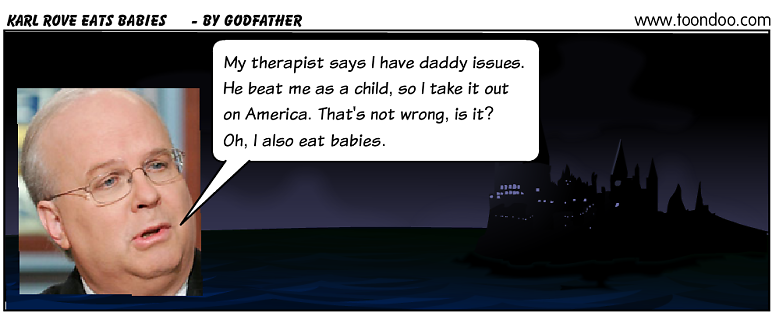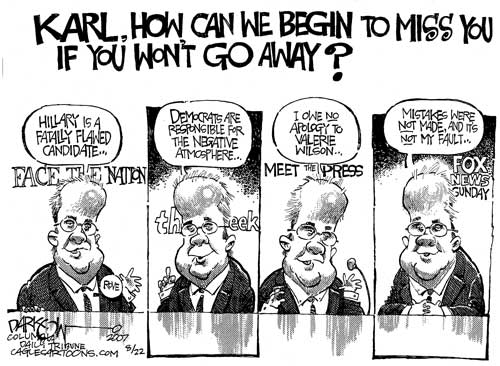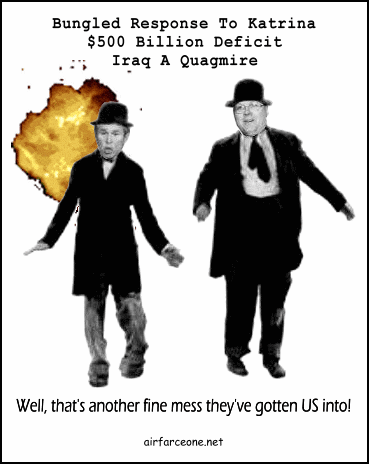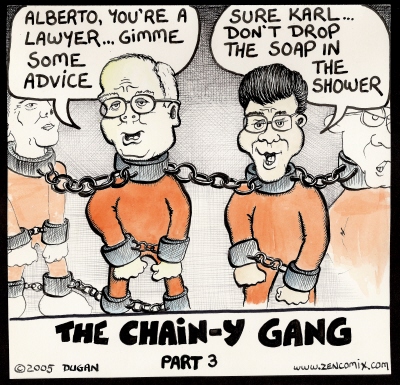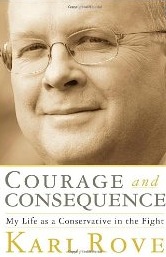Facts, Shmacts
Karl Rove Describes Alternate Universe In New BookBy Michael Sigman
In ancient times when newspapers could still afford to check facts, LA Weekly, where I was publisher, had a brilliant columnist whose grasp of the real world could be, on occasion, tenuous. Once, upon learning of a correction-in-the-making in his column, he balked, confronting a startled fact-checker with the line, “You have your facts and I have mine.”
Now that newspapers as we knew them are headed for extinction—over 30,000 journalists have lost their jobs in the past two years—the fact-checker is a quaint relic and the brazen 24/7 propaganda of Fox News, the lunacy of Glenn Beck and the content-free sarcasm of Sarah Palin threaten to leave reality-based debate in the dust. The “let’s look at both sides no matter how crazy one side is” modus operandi of the mainstream media makes things worse by giving credence to demonstrably false “opinions” about settled matters like evolution and climate change. And sure, there’s exaggeration on the Left too, but at least the polemics of Keith Olbermann and Michael Moore are, no pun intended, moored in the real world.)
Karl Rove, who orchestrated George W. Bush’s two presidential campaigns and was White House politician-in-chief until deep into W’s second term, isn’t batty like Beck or vacuous like Palin. But, as he (often inadvertently) demonstrates in his oddly-named new book Courage and Consequences, Rovian truth-twisting played a crucial role in undermining whatever common ground used to underpin political discussion in America.
Rove begins with an open and often moving account of his childhood. A grandmother who attempted suicide, divorced parents—a mother who succeeded in killing herself and an adoptive father who was probably in the closet (Rove only learned of his adoption, by accident, after he’d graduated from college)—helped shape the smart, driven, crafty and suspicious man Rove would become.
Rove’s coverage of his early political career as a Republican on the rise is informative and reasonably straightforward. His “What Is a Rovian Campaign” chapter in particular is interesting reading for friends and foes alike.
When George W. Bush comes into play, things get surreal. Rove foreshadows his distorted depiction of the Bush presidency when first he beholds his future meal ticket’s magnificence in 1973: "George W. Bush walked through the front door, exuding more charm and charisma than is allowed by law. He had on his Air National Guard jacket, jeans, and boots." (No need to get all Freudian here—sometimes an Air National Guard Jacket is just an Air National Guard Jacket.)
Once we get past Bush’s upset Texas Gubernatorial win over Anne Richards and into presidential politics, the book becomes a glorification of the worst administration in modern history.
Rove needs to believe that his president was a hero to burnish his own role as the genius behind the throne. So in this telling, W.’s most disastrous decisions morph into virtuous acts of leadership, and all problems are the fault of the Left, liberals, Democrats or some variation thereof.
For Rove, the “true villains” of the worst financial crisis since the Great Depression were Democratic Senator Chris Dodd and Congressman Barney Frank. The Iraq war? Hey, everyone thought Saddam had WMDs. (That Bush and company lied repeatedly about their existence is nicely demonstrated by David Corn here (http://motherjones.com/politics/2010/03/karl-rove-book-george-bush-iraq-wmd). And anyway, the war turned out great.
Torture? Just the opposite! "[T]he president never authorized torture. He did just the opposite by making sure the EITs [enhanced interrogation techniques on high-value terrorist detainees] did not cross the legal line into torture.”
Political firings of U.S. Attorneys? The claims of a bunch of “Conspiracy buffs.” Failure of immigration reform? Democratic Senator Harry Reid. Social Security reform dead in the water? Congress didn’t have the guts of our brave Commander-in-Chief.
As for W.’s signature failure—the appalling mishandling of Hurricane Katrina—Rove deflects all blame onto Ray Nagin, the hapless Mayor of New Orleans and Kathleen Blanco, the Governor of Louisiana, who, to be sure, deserve opprobrium but whose conduct only underscored the need for Federal leadership. Rove does admit one Katrina-related mistake. In an apologia that’s the rough equivalent of the job seeker who admits his greatest weakness is that he’s a perfectionist, he concedes a failure to communicate W’s heroism: "Our weak response in defense of the president and in setting the record straight, is, I believe, one of the biggest mistakes of the Bush years."
As for accusations of Rovian misconduct, the author dismisses Plamegate—for which he was this close to being indicted for outing CIA Agent Valerie Plame—as a relentlessly unfair persecution by Patrick Fitzgerald, in truth a non-partisan Special Counsel. Rove also denies masterminding the many dirty tricks he’s accused of, but doesn’t seem to mind the results: "I did not conceive, create, craft, prepare, or have anything to do with the [2002 now-Sen. Saxby] Chambliss television ad [attacking incumbent senator Max Cleland of Georgia, a war hero and triple amputee, using images of Osama bin Laden and Saddam Hussein]. But I thought it was effective because it was factual."
Rove concurs with at least one Democrat on at least one issue: Rove’s own genius. He claims that Bill Clinton, in the wake of the Republicans’ 2006 mid-term election drubbing—which W. himself characterized by admitting “We got thumped”—told him that losing only 30 seats in the House and six Senate seats was evidence of “Sheer genius.”
Rovian table-turning is nicely exemplified in his description of the 2006 scandal in which Congressman Mark Foley (R. FL) was brought down for sexual harassment of underage House pages. The problem here, according to Rove, was really then-Democratic House whip (and current Obama chief of staff) Rahm Emanuel. Rove sets the stage with a cunning trifecta: 1. Repeat a nasty rumor: “According to one report, Emanuel knew about the emails prior to their public disclosure.” 2. Attribute a nasty motive to the alleged bad actor: “perhaps preferring to keep the emails for use as a campaign issue.” 3. Explain the awful consequences of 1 and 2. “If true, Emanuel didn’t feel any moral requirement to keep his Republican colleague from preying on other innocent pages in the meantime.” Conclusion? “I believe Emanuel had a responsibility to report what he knew of Foley’s behavior immediately.”
There’s nothing surprising about Rove’s spirited, manipulative defense of his President. The tragedy is the mainstream media’s reaction to Courage and Consequences, which largely rewards the Right’s reframing of the national debate. Though some, like columnist Walter Shapiro, call the author on his dishonesty, (http://www.politicsdaily.com/2010/03/09/karl-rove-has-a-good-book-in-him-but-this-one-wasnt) most of the reviews are downright deferential. Conventional wisdom arbiter Mark Halperin—whose http://thepage.time.com/ is must reading for the self-flagellating political and media class—won’t go farther than to say Rove employs “occasionally selective facts when assailing his targets.” And the Washington Post’s Steven Levingston waxes positively rhapsodic when describing the Rovian repositioning of the Katrina debacle: “Always thorough in his research and laser sharp as a tactician, Rove is able–-ital mine—to turn even his administration's mea culpas into rallying cries. Case in point: Bush's infamous cheer of ‘Brownie, you're doing a heck of a job!’ While this intemperate remark came to characterize Bush's failure to comprehend the degree of misery caused by Hurricane Katrina, Rove puts it in a context that reveals the good heart that beat inside the president.”
Halperin’s review ends with a perfect execution of on-the-one-hand-on-the-other-hand drivel: “Those still smarting over the repercussions of the Bush administration will be particularly annoyed by Rove’s conclusion that Bush’s ‘achievements over eight years were impressive, durable and significant.’ Still, Courage and Consequence is an entertaining and enlightening memoir, written by a man who is well aware he will continue to be a polarizing figure no matter where he goes from here.”
There are tens of millions of Americans who are not just “smarting” or “annoyed.” We’re appalled and outraged that the Bush Administration wreaked havoc on our financial system, our standing in the world community and, most tragic, on the young people whose lives have been destroyed by an unnecessary war.
If nothing else, Karl Rove’s Courage and Consequences might serve future generations as a useful snapshot of how politics and media created and perpetuated a fantasy about the failed Presidency of George W. Bush.
Writer/editor, media consultant, music publisher Michael Sigman is a regular Huffington Post blogger. Follow Michael Sigman on Twitter: www.twitter.com/majorsongs
Karl Rove’s Courage and Consequences is available at www.amazon.com
Founder/Publisher/Editor: David McGee
Contributing Editors: Billy Altman, Laura Fissinger, Christopher Hill, Derk Richardson
Logo Design: John Mendelsohn (www.johnmendelsohn.com)
Website Design: Kieran McGee (www.kieranmcgee.com)
Staff Photographers: Audrey Harrod (Louisville, KY; www.flickr.com/audreyharrod), Alicia Zappier (New York)
E-mail: thebluegrassspecial@gmail.com
Mailing Address: David McGee, 201 W. 85 St.—5B, New York, NY 10024


